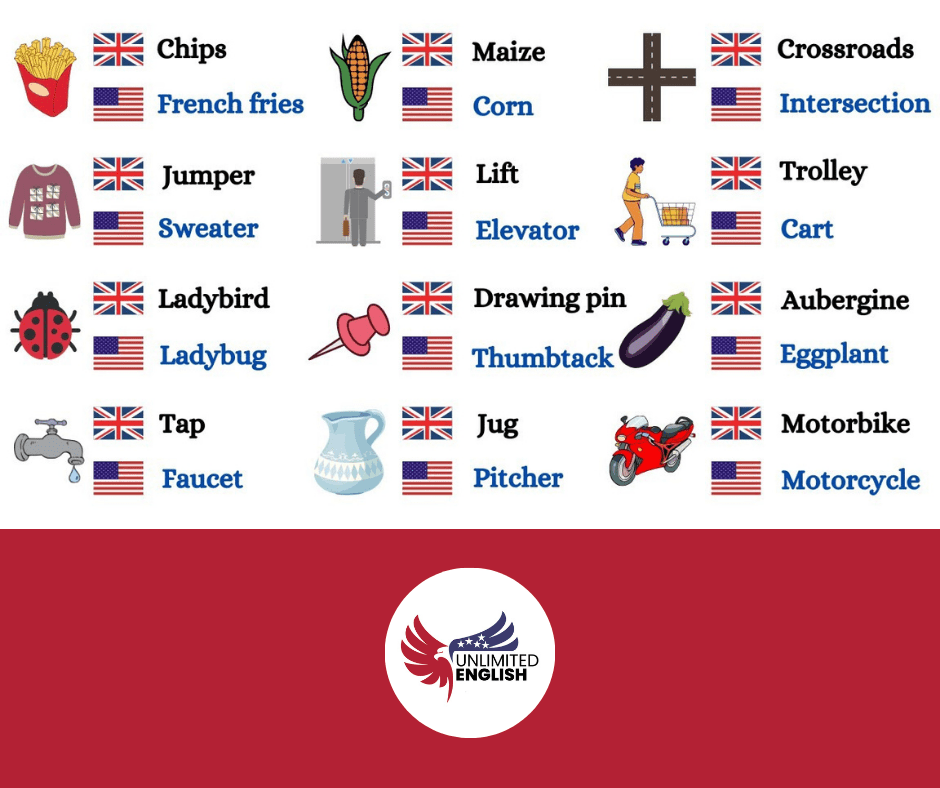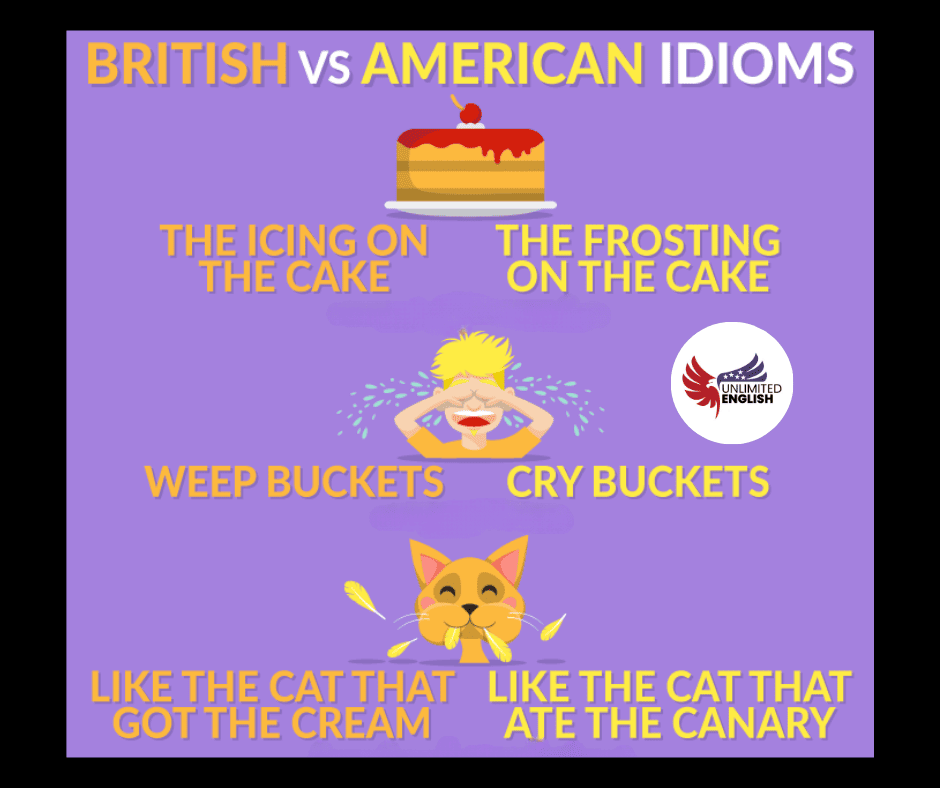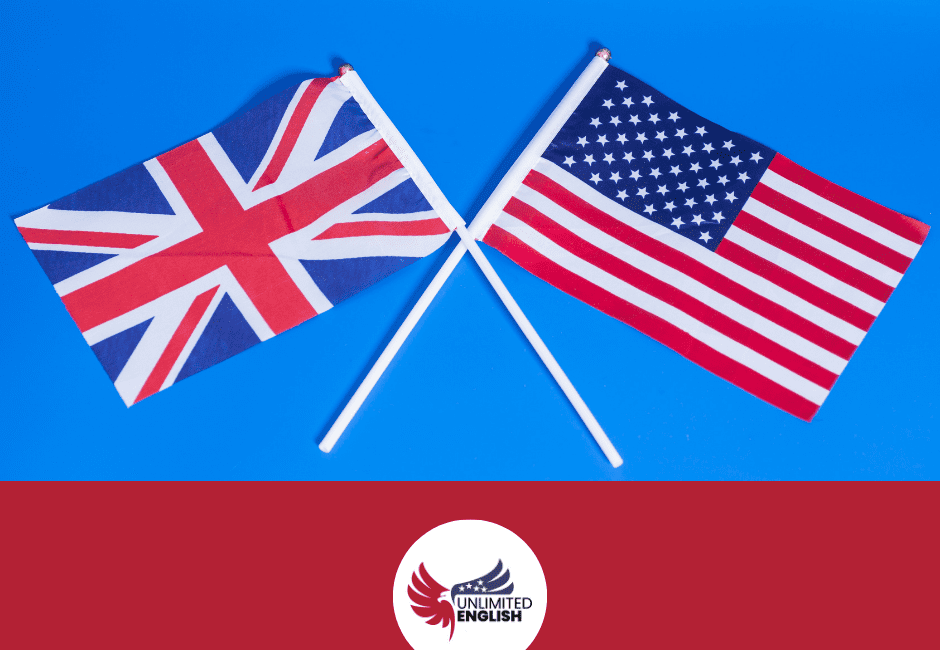English is often referred to as a global language, but it doesn’t sound or look the same everywhere it is spoken. While British and American English share a common origin, the two have diverged in various ways over the centuries. These differences are seen not only in pronunciation, but also in spelling, vocabulary, grammar, and even punctuation. This blog explores the key differences between British and American English to help learners and speakers navigate these two major forms of the language.
14 Differences Between British and American English in Costa Rica
1. Historical Background: The Origins of the Divide
The differences between British and American English began after the colonization of the Americas in the early 1600s. When British settlers arrived, they brought their version of the English language with them, but the isolation from Britain allowed the language in America to evolve independently. Over time, various factors such as immigration, culture, and innovation shaped American English into the distinct variant we know today.
Noah Webster, the American lexicographer and founder of the first American dictionary, was also instrumental in shaping American English spelling. He believed in simplifying British English spelling and making it more phonetic, which laid the foundation for many of the distinctions we see today.
14 Differences Between British and American English in Costa Rica
2. Pronunciation: Accents and Stress Patterns
The most obvious difference between British and American English is pronunciation. The UK has a wide variety of regional accents, from the “Received Pronunciation” (RP) often associated with formal British English, to regional accents such as Cockney, Scottish, and Northern English. Similarly, the United States is home to diverse accents, from the New York twang to the Southern drawl. However, there are some broad generalizations that can be made about how each version of English sounds.
a. Rhotic vs. Non-rhotic
American English is mostly rhotic, meaning that speakers pronounce the ‘r’ in words like «car» and «hard,» no matter where it falls in a word. In contrast, many British English accents, including RP, are non-rhotic, meaning the ‘r’ is often silent unless it comes before a vowel. In British English, “car” may sound like “cah.”
b. Vowel Sounds
British and American English also differ in their vowel sounds. For example, the vowel in the word “dance” is pronounced differently. In American English, it’s typically pronounced as /æ/ (like the “a” in “cat”), whereas in British English, it is pronounced with a longer vowel sound, /ɑː/ (similar to “father”).
c. Intonation and Stress
The rhythm and stress of sentences also vary. American English often has a more “drawn-out” or flattened intonation, while British English can have a more varied pitch and sometimes sounds more clipped or “bouncy.” For example, Americans might stretch out the vowel sounds in words like “do” or “too,” whereas British speakers may pronounce these words more concisely.
14 Differences Between British and American English in Costa Rica
3. Spelling: Different Rules, Same Words
One of the most commonly noticed differences between British and American English is spelling. The differences largely stem from Noah Webster’s efforts to reform English spelling in America in the late 18th century. His goal was to simplify and standardize spelling to make it more intuitive and phonetic. Here are some of the major differences:
a. The -our vs. -or Suffix
In British English, words like «colour,» «favour,» and «honour» use the suffix “-our.” American English, however, simplifies these words by dropping the «u,» resulting in «color,» «favor,» and «honor.»
b. The -ise vs. -ize Ending
British English often uses the ending «-ise» in words like «realise,» «organise,» and «recognise.» In contrast, American English prefers «-ize,» resulting in «realize,» «organize,» and «recognize.» Interestingly, Oxford University Press in the UK endorses the “-ize” form, but it remains more common in American English overall.
c. The Doubling of Consonants
In British English, when adding a suffix to a word with a short vowel before a final consonant, the consonant is often doubled. For example, in British English, «travelling» and «cancelled» have a double ‘l,’ whereas American English simplifies this to «traveling» and «canceled.»
d. Other Spelling Differences
- British English: theatre, cheque, metre
- American English: theater, check, meter
14 Differences Between British and American English in Costa Rica
4. Vocabulary: Different Words for the Same Thing
Vocabulary is another area where British and American English diverge significantly. In some cases, the same object is referred to by entirely different words, while in other cases, the same word might have different meanings depending on which side of the Atlantic you’re on.
a. Everyday Objects
- British English: boot (of a car), bonnet, lorry, flat, lift
- American English: trunk, hood, truck, apartment, elevator
These differences can sometimes cause confusion, particularly for learners of English or when traveling.
b. Clothing
- British English: trousers, jumper, waistcoat, braces
- American English: pants, sweater, vest, suspenders
It’s important to note that some words, like «pants,» mean something entirely different in British English; “pants” in the UK refers to underwear, which could lead to some awkward misunderstandings!
c. Food and Drink
- British English: biscuit, crisps, chips, aubergine, courgette
- American English: cookie, chips, fries, eggplant, zucchini
Again, this can cause confusion, particularly in restaurants or cafes, where you might end up ordering something quite different from what you expected.

14 Differences Between British and American English in Costa Rica
5. Grammar: Subtle but Significant
While the basic structure of English grammar remains the same on both sides of the Atlantic, there are several subtle grammatical differences between British and American English.
a. The Present Perfect
British English often uses the present perfect tense to describe an action that has just happened. For example:
- British English: «I’ve just eaten.»
- American English: «I just ate.»
Americans are more likely to use the simple past in this case, which can sound strange to British ears.
b. Collective Nouns
In British English, collective nouns (such as «team» or «family») are often treated as plural, implying that the group is made up of individuals.
- British English: «The team are winning.»
- American English: «The team is winning.»
This difference can be confusing for learners trying to master subject-verb agreement.
c. Use of «Have Got»
British English frequently uses «have got» to indicate possession, whereas American English often simplifies this to «have.»
- British English: «I’ve got a car.»
- American English: «I have a car.»
14 Differences Between British and American English in Costa Rica
6. Punctuation: Small but Noticeable Variations
Even punctuation can differ between British and American English, although these differences are subtle and might not be as easily noticed as spelling or vocabulary changes.
a. Quotation Marks
In British English, single quotation marks are typically used first, with double quotation marks used for quotes within quotes.
- British English: ‘He said, «It’s raining outside.»’
- American English: «He said, ‘It’s raining outside.’»
b. The Oxford Comma
The use of the Oxford comma (a comma before the conjunction in a list) is more common in American English, though it’s a matter of stylistic preference rather than a hard rule.
- British English: «I bought apples, oranges and bananas.»
- American English: «I bought apples, oranges, and bananas.»
14 Differences Between British and American English in Costa Rica
7. Idiomatic Expressions and Slang
Idiomatic expressions and slang are where British and American English can feel most foreign to each other. These are expressions that often don’t make literal sense but are deeply rooted in the culture of each country. For example:
- British English: “I’m knackered!” (I’m very tired)
- American English: “I’m beat!” (I’m very tired)
- British English: “Fancy a cuppa?” (Would you like some tea?)
- American English: “Wanna grab some coffee?” (Would you like some coffee?)

14 Differences Between British and American English in Costa Rica
8. Influence of Media and Technology
The global dominance of American media and entertainment means that American English has a wide influence around the world. American TV shows, movies, and music have led to the widespread use of American vocabulary and slang, even in countries that traditionally lean towards British English.
Technology, particularly the internet and social media, has also accelerated the blending of the two variants. Words like «email» and «texting» are universally understood, though British English might still refer to «texting» as «sending a message» or «sending an SMS.»
14 Differences Between British and American English in Costa Rica
9. Formality and Politeness
While both British and American English speakers are polite, there are some cultural differences in the way politeness is expressed in language, and this affects both spoken and written English.
14 Differences Between British and American English in Costa Rica
a. British Politeness
British English tends to use more indirect or formal language in everyday conversation, especially when making requests or offering opinions. Phrases like “Would you mind…” or “Could I possibly…” are common, and there’s often an emphasis on understatement and politeness. British speakers are also more likely to apologize or say “sorry” for small inconveniences.
- Example: «Sorry to bother you, but could I possibly borrow your pen?»
b. American Directness
In contrast, American English speakers are often more direct and less formal. While this doesn’t mean they are impolite, Americans are more likely to get straight to the point in conversation and may use simpler language for requests.
- Example: «Can I borrow your pen?»
The difference in formality can sometimes be interpreted as bluntness by British speakers or excessive politeness by Americans.
14 Differences Between British and American English in Costa Rica
10. Dialects and Regional Variations
While British and American English are the two dominant versions of the language, it’s important to note that each has a wide range of regional dialects that add further complexity.
14 Differences Between British and American English in Costa Rica
a. British Dialects
In the UK, the diversity of accents and dialects is immense, and certain regions have vocabulary, pronunciation, and grammar that differ significantly from standard British English (Received Pronunciation). For example, in Scotland, the Scots language is sometimes used interchangeably with English, and in Liverpool, the Scouse accent is famous for its distinctive sounds.
- Examples of Regional British English:
- Scouse (Liverpool): “Lad” for a boy, “sound” for good or fine.
- Geordie (Newcastle): “Aye” for yes, “bairn” for child.
b. American Dialects
The United States also has considerable variation in regional dialects. The Southern accent, for example, is often characterized by slower speech and longer vowel sounds. Meanwhile, the New England accent (such as the Boston accent) is famous for dropping the ‘r’ sound, similar to non-rhotic British accents.
- Examples of Regional American English:
- Southern English: “Y’all” for you all, “fixin’ to” meaning about to do something.
- New York English: “Cawfee” for coffee, “tawk” for talk.
These regional differences are important when considering the diversity of English, and they highlight that there is no single, standard «American» or «British» English.
14 Differences Between British and American English in Costa Rica
11. Educational Approaches: Teaching British vs. American English
For students learning English, the differences between British and American versions can be a significant point of consideration. Depending on where a student plans to study or work, they may choose to focus on one version over the other. Many English-language curriculums around the world still tend to favor British English, particularly in former British colonies, while American English often dominates in countries influenced by American culture and media.
14 Differences Between British and American English in Costa Rica
a. Spelling and Grammar in Schools
In many schools around the world, the curriculum is more likely to adhere to British English conventions, particularly in terms of spelling. However, as global communication increases, teachers and students may find themselves switching between the two forms depending on the context.
- In the UK: The focus remains on British English spelling and grammar, though exposure to American media means students often pick up Americanisms naturally.
- In the US: American spelling and grammar are taught exclusively, with little emphasis on British English variations except as part of a study of literature or international cultures.
b. Standardized Tests
When preparing for standardized English proficiency exams like TOEFL (Test of English as a Foreign Language) or IELTS (International English Language Testing System), students must be aware of the English variant being tested. TOEFL, for example, uses American English, while IELTS offers both British and American English options, though British English tends to be more common.
14 Differences Between British and American English in Costa Rica
12. Business English: Which Variant to Use?
When it comes to business, particularly in international settings, the distinction between British and American English can be more than just a linguistic curiosity—it can have practical implications. Businesses that operate internationally need to consider their audience and decide which variant to use for their communications, branding, and even contracts.
14 Differences Between British and American English in Costa Rica
a. British English in International Business
British English is often considered the standard in international business, particularly in Europe, Africa, and Asia. In formal business settings, British English is sometimes perceived as more traditional or formal, which might appeal to companies that want to convey a sense of sophistication.
- For instance, British spelling is commonly used in formal documents in international organizations, such as the United Nations and the European Union.
b. American English in Business
On the other hand, American English is frequently used in international business, especially in sectors like technology and entertainment, where American companies often dominate. The straightforward, concise nature of American business English is sometimes seen as more modern and dynamic.
- For companies targeting the American market or working with American businesses, using American spelling and terminology is the standard.

14 Differences Between British and American English in Costa Rica
13. Media and Popular Culture
The influence of media cannot be overstated when it comes to the spread and blending of British and American English. Television, movies, and music from the US have been a powerful force in popularizing American English around the world. However, British media, such as the BBC, and iconic franchises like Harry Potter, also have a significant influence.
14 Differences Between British and American English in Costa Rica
a. American Media Dominance
American movies, TV shows, and music dominate global entertainment, leading to a widespread familiarity with American English vocabulary, slang, and pronunciation. As a result, people in non-English-speaking countries might be more likely to learn American English, simply because they are exposed to it more frequently.
- For example, phrases like «awesome» and «cool» have become global slang due to American influence.
b. British Cultural Exports
British English has also made its mark through literature, music, and television. Shows like Downton Abbey or The Crown have exposed global audiences to British accents and expressions, while British authors like J.K. Rowling have helped cement certain British phrases and vocabulary in popular culture.
- British music icons like The Beatles or contemporary stars like Adele often maintain their British accents, even as they achieve international fame, helping to spread British pronunciation and expressions.
14 Differences Between British and American English in Costa Rica
14. Future Trends: Convergence or Further Divergence?
As the world becomes more interconnected through globalization and the internet, some argue that British and American English will continue to blend and converge over time. Already, younger generations, influenced by social media and global entertainment, are mixing vocabulary and pronunciation from both variants.
However, linguistic purists might argue that the two forms of English will continue to diverge, as regional pride and national identity often play a role in preserving language differences.
14 Differences Between British and American English in Costa Rica
a. Blending of Vocabulary
Global platforms like YouTube, Instagram, and TikTok have allowed British and American speakers to influence each other more directly than ever before. It’s becoming increasingly common for American speakers to adopt British slang, and vice versa.
- Example: British phrases like “cheers” (thanks) and “mate” (friend) are increasingly used by Americans, while American expressions like “awesome” or “dude” are often heard in the UK.
b. Lingering Differences
At the same time, many differences between the two forms of English persist, particularly in formal writing and in regional dialects that resist outside influence. The persistence of these differences may be tied to cultural identity, as language is often seen as a marker of national pride.
14 Differences Between British and American English in Costa Rica
In conclusion, while British and American English are distinct in many ways, they also share common roots, and the global spread of English means that the two versions are constantly interacting and influencing each other. Whether you’re a language learner, a traveler, or simply a curious speaker, understanding the differences between these two variants can enrich your appreciation of the diversity and adaptability of the English language.
Whether you’re learning for business, travel, or personal growth, understanding the differences between American and British English can give you an edge. Ready to master both? At Unlimited English we can help you to get more knowledge about this interesting topic. Do not hesitate to study with our native English instructors, fill out the form or contact us through Whatsapp! Let us help you navigate the nuances and sharpen your language skills!

